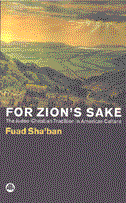 For
Zion’s Sake: The Judeo-Christian Tradition in American Culture
For
Zion’s Sake: The Judeo-Christian Tradition in American Culture
Fuad Sha’ban
Pluto Press, 2005,
250 pages, isbn 0-7453-2236-0
Reviewed for the Journal of Holy Land Studies
Why does so much of the world hate America? Why are Britain and the United States in a heightened state of alert against attacks from Islamist extremists? In For Zion’s Sake, Fuad Sha’ban explains some of the reasons, tracing the role of religion and the rise of pro-Israeli Christian fundamentalism within American culture. He examines the historical development of the Judeo-Christian tradition in America from Columbus to Bush, with particular reference to the Colonial era. He traces its impact on America’s self image and the way in which this has shaped American perceptions of the Arab world.
Born in Damascus in Syria, Professor Fuad Sha’ban gained his PhD from Duke University and is currently Dean of Arts and Sciences at the University of Petra in Jordan. For Zion’s Sake includes revised material from his earlier book Islam and Arabs in Early American Thought: The Roots of Orientalism in America (1991). For Zion’s Sake originally appeared in Arabic, winning the Zarqa University Award for the Most Outstanding Book on the Arab-Zionist Conflict in 2004.
The
book begins with two important American endorsements: a foreword by Ralph Briabanti,
Professor of Political Sciences at Duke University, and an illuminating introductory
essay by Louis Budd, Professor of English also at Duke University.
They confirm that Sha’ban writes as a friendly critic of America. In his essay, Budd says this of the author,
“He combines objectivity with empathy because his Middle Eastern origins are balanced by education in the United States and close personal bonds. Fully aware of British and European Orientalism, he does not indict Americans as being particularly misled. Rather, he strikes an engaging tone avoiding sardonic irony or even scolding, he allows readers to form their own verdict. ”
The book contains four main sections: Part 1 entitled ‘In the Beginning’ explores the role of Christopher Columbus in reviving the vision of the Crusaders and the ‘Quest for Zion’; Part 2 is entitled ‘Zion in America’ and examines the historical development of the American myth as the covenantal ‘Chosen’ people, through the biblical imagery, for example, of the Light of the World and as a City on a Hill; Part 3 is entitled, ‘The Promised Land’ and examines the influence of American travellers and writers to the Middle East; Part 4 is entitled ‘Religion in America’ and assesses the place of religion in American life, and in particular, the influence of contemporary apocalyptic Christian Zionism.
Sha’ban shows how this ‘Vision of Zion’ finds its roots in the literature of the colonial era. Looking in detail at a wealth of resources including secular poetry, political declarations and religious sermons, he reveals how America’s Puritan roots have fostered a specifically religious political culture which encourages extremism, Imperialism and Islamophobia. He cites various former US Presidents to corroborate this idea of ‘manifest destiny’. For example, on one occasion President Eisenhower asserted, “without God there could be no American form of Government, nor American way of life.” On another occasion he called upon people to pray to Almighty God,
“each day… to set and keep His protecting hand over us so that we may pass on to those who come after us the heritage of a free people, secure in their God-given rights and in full control of a government dedicated to the preservation of those rights.”
He goes on to show how, since the 1960’s especially, the Christian Right, epitomised by Jerry Falwell, has become the most powerful force in American politics, and why its unequivocal support for Zionism has ensured Israel become central to US foreign policy under both Democrat and Republican administrations.
This is a well researched and gracious book developing and expanding on Edward Said’s thesis on Orientalism. Sha’ban acknowledges that, while very influential, especially in the White House and Congress, Christian Zionism is nevertheless a distortion of Christianity and is unrepresentative of the wider mainline Christian denominations of America.
This is an essential book for all who are genuinely concerned with understanding the causes of the Arab-American conflict, and doing something about it. Listening to what others think about us may be difficult, but if heeded, this book may well help reduce tensions ‘for Zion’s Sake’ as much as for the sake of Arab-American relations both internally and internationally. To quote Sha’ban’s final sentence, “…the hope is that prudence and common sense will temper anger and fear before it is too late.”
Stephen Sizer
© August 2005